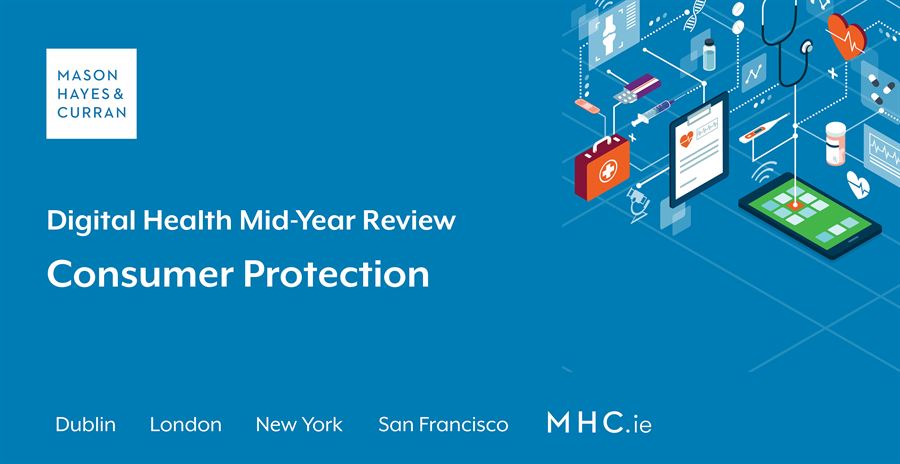
The Changing EU Consumer Law Landscape
Despite the COVID-19 crisis, the EU has continued with its plans to reform the operation of the EU Digital Single Market. A key pillar of this initiative is the changes to the current consumer law regime. These new rules will come into effect on a staggered basis over the next 18 months or so and will have a significant impact on how digital health companies engage with EU consumers.
The New Consumer Deal and Enforcement
The Omnibus Directive will significantly change a number of European e-commerce laws that apply to traders such as healthcare platforms when they deal with consumers. This legislation will reform and modernise a number of key pieces of existing EU laws around consumer protection. The overall goal of the European Commission is to improve transparency and outcomes for consumers when they transact with traders online.
One area of focus for the European Commission has been the Unfair Commercial Practices Directive (UCPD). The revised UCPD will have increased transparency requirements and advertising restrictions for traders. This will obviously be a time consuming and burdensome task for digital health companies and will have a significant impact on how services can be marketed to consumers. For example, the rules around the transparency requirements in relation to paid-for advertising will be significantly tightened. There are stricter rules on the posting of user reviews on websites and traders will be required to state the previous selling price where they are running a price reduction promotion targeting consumers.
One particular aspect of the Omnibus Directive which has received a lot of attention is the potential for increased penalties and turnover-based fines for breaches of not less than 4% of a trader’s annual turnover (in the member state) or at least €2 million when information on turnover is not available. This will be a dramatic change from the current enforcement regime which currently exists across the EU to GDPR-level widespread fines.
The Digital Content Directive
Currently, there is no EU legislation specifically addressing consumer contracts for the supply of digital content and digital services meaning that the regulation of digital health services is covered by a patchwork of existing legislation that was not specifically designed to deal with new technologies and business models. The Digital Content Directive (DCD) will update consumer law in relation to the sale of digital services and digital content and will take effect from 1 January 2022. Digital content will capture software apps. Although healthcare has been specifically excluded, health apps are included (where the app does not require a prescription by a doctor or other healthcare professional).
An interesting element of the DCD is that it has specifically recognised that payment can be in the form of the provision of personal data. Personal data is included to ensure that consumers are entitled to contractual remedies, even in the case of ‘free’ apps which rely on the provisions of personal data to monetise the product. However, the DCD will not apply in instances where the personal data is required to perform the service, for example, where the consumer uploading their geographical location on to a fitness app is necessary for the app to record distance and to function properly.
The liability and redress provisions of the DCD will provide a significant degree of clarity for businesses operating in this area as it will set the parameters for what is required from the digital content or service. The DCD specifically provides that the digital content or digital service must comply with subjective and objective conformity criteria. Interestingly, privacy by design and privacy by default are identified as being objective conformity criteria, which means that a failure to adequately take into account privacy principles will not only be a GDPR issue, but will also give rise to consumer law concerns. Health app providers will be required to provide consumers with updates regularly in subscription services, however if the consumer fails to install the update, they can potentially be responsible for any resulting lack of conformity, such as those that address security concerns.
The summer package
In June 2020, the European Commission announced a Digital Services package and is running a public consultation to review existing obligations in the online environment, particularly in relation to transparency of commercial communications and digital advertising. Some of the areas under review are intermediaries, disinformation and fake news.
The Online Platform Regulation (P2B Regulation) takes effect on 12 July 2020. While the P2B Regulation will not directly affect most Digital Health businesses, it will capture some services which operate as platform models. The P2B Regulation is a move towards increased transparency of terms and conditions and the digital platform will require notice for changes or updates to terms and conditions, in the case of termination and a statement of reasons. The digital platform is required to publish a complaints handling process and appoint independent mediators and be willing to engage in mediation with business users in the event of a dispute.
What lies ahead in the future?
Although the current global environment remains very uncertain, the European Institutions are focusing on longer term digital trends and innovations. In early June 2020, the European Parliament published the New Developments in Digital Services to 2030. Among the predictions, which focus on digital transformation up to 2025, one of the most influential trends identified are innovations such as individualised health care technology. The Report suggests that member states take a proactive rather than reactive approaches to prevent health issues as quickly as possible, which will be enabled by technological change e.g. app and cloud-based software.
This indicates that the development of digital health initiatives and customised health apps in Europe will be more of a priority than ever before.




